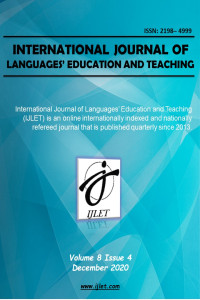Türkiye'de İngilizce Öğretim Programlarının Teknoloji Entegrasyonu Fırsatları Açısından Değerlendirilmesi
Öz
Yabancı dil öğrenme ve öğretme sürecine teknolojinin dâhil edilmesi; mobil, bilgisayar ve internet
destekli dil öğrenme fırsatlarındaki son gelişmelerin ortaya çıkmasıyla büyük önem kazanmıştır. Bu
çalışma, 2-8 ve 9-12. sınıflar için mevcut İngilizce öğretim programlarında sunulan teknoloji
entegrasyonu fırsatlarını ortaya çıkarmayı amaçlamaktadır. Yapılan doküman incelemesinden elde
edilen bulgulara göre, İngilizce öğretim programlarının teknoloji entegrasyonunu açıkça tavsiye ettiği
belirlenmiştir. Teknoloji kullanımına yapılan vurgu, özellikle öğretim programlarının da ana
felsefesine dâhil edilmiştir. Ayrıca, teknoloji entegrasyonunun, öğrenciler için zenginleştirilmiş
bağlamlar sağlamak, teknolojiyle geliştirilmiş görevler, etkinlikler ve değerlendirme teknikleri
tasarlamak için özellikle tavsiye edildiği belirlenmiştir.
Anahtar Kelimeler
: İngilizce öğretim programı teknoloji entegrasyonu BİT teknolojiye dayalı program
Kaynakça
- Bruce, B., & Levin, J. (2001). Roles for new technologies in language arts: Inquiry, communication, construction, and expression. In J. Jenson, J. Flood, D. Lapp, & J. Squire (Eds.), The handbook for research on teaching the language arts. NY: Macmillan.
- Chapelle, C. A. (2001). Computer applications in second language acquisition foundations for teaching, testing, and research. Cambridge University Press, UK. https://doi.org/10.1017/CBO9781139524681
- Chapelle, C. A. (2003). English language learning and technology: Lectures on applied linguistics in the age of information and communication technology. John Benjamins Publishing.
- Council of Europe (2006). A user’s guide to the European Language Portfolio reference documents. Strasbourg: Council of Europe. [Available at http://www.coe.int/portfolio, section ‘Procedure for validation’.]
- Council of Europe 2001, Common European Framework of Reference for Languages: Learning, Teaching, Assessment. Language Policy Division, Strasbourg, France.
An Evaluation of English Language Teaching Curricula in Turkey in terms of the Opportunities for Technology Integration
Öz
Technology integration into foreign language learning and teaching process is attached great
importance with the advent of recent developments in mobile, computer, and web-enhanced language
learning opportunities. This study aims to uncover the opportunities for technology integration
presented in the current English language teaching (ELT) curricula for 2nd -8
th and 9th-12th grades.
Document analysis of the curricula indicated that technology integration is strongly recommended in
language learning and teaching process in the English as a foreign language (EFL) context of Turkey.
The emphasis on technology use is particularly included in the major philosophy of the curricula. It
was also determined that technology integration is specifically recommended for providing enriched
contexts, designing technology-enhanced tasks, activities, and assessment techniques for learners.
Anahtar Kelimeler
ELT Curriculum technology integration ICT technology-based curriculum
Kaynakça
- Bruce, B., & Levin, J. (2001). Roles for new technologies in language arts: Inquiry, communication, construction, and expression. In J. Jenson, J. Flood, D. Lapp, & J. Squire (Eds.), The handbook for research on teaching the language arts. NY: Macmillan.
- Chapelle, C. A. (2001). Computer applications in second language acquisition foundations for teaching, testing, and research. Cambridge University Press, UK. https://doi.org/10.1017/CBO9781139524681
- Chapelle, C. A. (2003). English language learning and technology: Lectures on applied linguistics in the age of information and communication technology. John Benjamins Publishing.
- Council of Europe (2006). A user’s guide to the European Language Portfolio reference documents. Strasbourg: Council of Europe. [Available at http://www.coe.int/portfolio, section ‘Procedure for validation’.]
- Council of Europe 2001, Common European Framework of Reference for Languages: Learning, Teaching, Assessment. Language Policy Division, Strasbourg, France.
Ayrıntılar
| Birincil Dil | İngilizce |
|---|---|
| Konular | İkinci Bir Dil Olarak İngilizce |
| Bölüm | Araştırma Makalesi |
| Yazarlar | |
| Yayımlanma Tarihi | 30 Aralık 2020 |
| Yayımlandığı Sayı | Yıl 2020 Cilt: 8 Sayı: 4 |


